#neurodivergence representation
Explore tagged Tumblr posts
Text
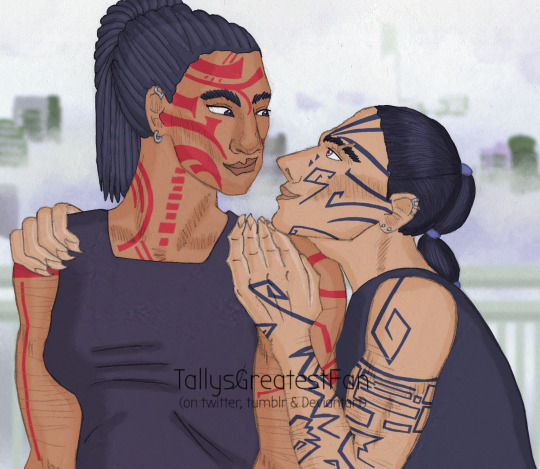
Disabled4Disabled ships spotlight for Disability Pride Month: Tally Youngblood and Shay from Scott Westerfelds Uglies Series.
As much as I love them and as much as their stories helped me accept my own neurodivergence, I was hesitant to include them here and can only recommend Uglies with a huge caveat.
First reason: Unlike the other ships I include in this, Tally/Shay is not canon, it is just the relationship the series focuses on the most and has a fairly strong subtext.
Second reason: While the way the series portrays both Tally and Shays increasingly intense, for the lack of better words, general neurodiversity, and especially Tallys choice at the end, was groundbreaking for this time period and is even now much braver than what most novels would do – the way the series portrays their self-harming and Tallys and her boyfriend Zanes eating disorders is not good to say it friendly.
I don’t think the whole series is irredeemable, because everything else about it is just so good, but it is something you have to be aware of going in.
The issue lies not so much in the characters glorifying both as ways to escape their dystopian brainwashing, dystopias are famous for unreliable narrators, but that the disconnect between them doing this and the narrative and the author knowing that this is not a healthy way to deal with this is not better established.
It is also described not just fairly explicit, but also in a way that made readers who actually dealt with these issues feel alienated, since the self-harm is first described in a fairly antagonistic cult-like clique, and Tally and Zanes clique amicably mock them for loosing weight and becoming bony and haggard.
Why was this still so healing for me as a queer autistic woman with bipolar disorder?
Close to every book says that being different is okay and you should not conform to societal ideals. Uglies actually shows how insidious societal expectations are, how you still believe them even when they harm you, and how much it hurts to be lonely and different. With Uglies, you can believe it when it says being different (neurodivergent, queer) is okay, because it feels like it understands how hard it is.
In the first book, their neurodivergence is only hinted at, if anything. Tally doesn’t has many friends and all of them already were made into the older societal caste aka Pretties. She is lonely, and she desperately wants to be like them too, normal, how she should be. She meets Shay, who doesn’t fit in either, but takes the opposite route, rebelling against the system and being just so angry. It feels like the two extremes neurodivergent people can deal with their differences.
Their friendship made me feel so seen. It was deep and close, but also so jealous and it becomes increasingly more toxic and complex, as their dystopian system pushes them against each other again and again. It felt like all these messed up, failed female friendships I had. Even with how homoerotic it is, but both of them are too trapped in their other relationships and their past to ever act on it.
In the second book, without spoilering too much, their neurodivergent behaviors become so much more clear and also self-destructive due to the golden-cage like environment they find themselves in.
And in the third book, it is explicitly mentioned that the way their brains work is very different from the norm in a mental illness way. Even if, spoilers for the rest of this paragraph, their neurodivergence is artificially altered to make them more effective (read: self-destructive) super soldiers. As their allies come up with a way to undo this, Shay choses to do it. But Tally refuses. This blew my mind as a teen. That you could actually see your neurodivergence as a part of yourself. Even if it’s seen as bad, or destructive, or inconvenient for yourself and others.
There also is a third disabled character, Tallys boyfriend Zane, who already from the first time we meet him has an eating disorder, and also later acquires brain damage that causes him problems with motor skills. Tally at this point is horrible ableist to him about the physical disability, being programmed to by her dystopian society, but both her and the narrative also very firmly know that this is bigoted and something she needs to overcome. It is uncomfortable and harrowing and tragic to watch, but IMO it is respectful even if the characters are not.
Ultimately, it depends on what you search for if this would be a good read for you. Are you searching for accurate, healing self-harm and eating disorder representation? Then this is absolutely the wrong book. Are you searching for a touching, thought-provoking story about beauty culture, societal pressure and human nature, told through the toxic friendship between two teenage girls in a dystopian society? Then I can only recommend it.
A movie of the first book will come out 13.September this year on Netflix, hope it’s as good as the book. Sadly, in the book racially ambiguous Tally is white in it though, but Shay stays a WOC.
#Uglies#Uglies Series#Scott Westerfeld#Tally Youngblood#Shay Uglies#Shay#Tally/Shay#Tally x Shay#disability representation#neurodivergence representation#scifi#disability pride month#disability art
32 notes
·
View notes
Text
youtube
Because the movie will come out at 13th September this year, I wanted to talk about an underrated detail of Scott Westerfelds Uglies series.
Just for clarification: I am delighted about Tally in the end choosing to stay neurodivergent. She and Shay absolutely understand by this time just harmful for them their self harm (and in Tallys case eating disorder) were and unlearn these, even if its very unrealistic how easily and fast they do that.
If this series feels healing for you or harmful will ultimately depend on what you're searching for. If you're searching for good self harm and/or eating disorder rep, it will not be good, but if you're searching for a complex female friendship with queer subtext, amazing futuristic worldbuilding, critique of beauty culture and increasingly more neurodivergence themes, you could like it.
Drawing is how I imagine them looking as Specials, a few years after the series. They are sadly not a canonical couple, but oh boy is there subtext.
And yeah, while this idea is even right now very rare and radical, and was even more so back then, it is not the only book to show it - "The Speed of Dark" by Elizabeth Moon even focused its whole dystopia on it. But Uglies just touched me more.
#neurodivergence#neurodivergence representation#neurodivergent#actually autistic#Uglies#Uglies Series#Scott Westerfeld#Tally Youngblood#neurodiversity#young adult#YA dystopia#dystopia#books#bookblr#Youtube
4 notes
·
View notes
Text
Percy’s face when Sally mentioned Grover playing a role in getting him kicked out of school…
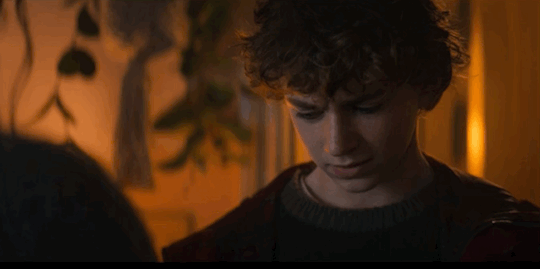
The way his face scrunches up really tight before relaxing? That’s anger.
But not the kind of anger we see in him in the last episode.
This is the kind of anger that makes you cry. The kind that’s underpinned by embarrassment and hurt and feeling like you’ve been treated unfairly.
Percy knows he didn’t push Nancy into the fountain and he thought that, if anyone would have his back, it was going to be Grover. And then he didn’t. And it’s unfair to Percy. It’s Wrong. Because no one believes him, apparently not even his best friend.
And the way he closes his eyes and takes a really deep breath? That’s a tactic that’s literally recommended to stop yourself from crying when you’re angry. It allows your body to “catch up” with your mind.
What do you wanna bet that Percy learned that from a school counselor?
#microexpressions#walker scobell#pjo tv show#pjo fandom#percy jackson#percy jackon and the olympians#pjo disney+#percy series#pjo#walker scobell is percy jackson#adhd percy jackson#neurodivergent percy jackson#accurate representation#percy jackson gif#pjo series#pjo gifs#percy pjo#rick riordan#riordanverse#percy jackson thoughts#grover underwood#grover pjo#percy and grover#pjo episode 1#percy jackson disney+#pjo sally jackson#sally jackson
9K notes
·
View notes
Text
This might be due to the fact that on my first playthrough I ended up creating a Rook more emotionally guarded than any of the companions except Minrathous-route Lucanis and perhaps Neve, so I was primed to look for it, but I never got the sense that the companions don’t care for Rook (the thought never even occurred to me until I saw other people post about it) — to me it seems much more like it’s Rook who keeps the last bit of distance, Rook who pulls away when the companions try to extend their care or worry too directly, who keeps themselves slightly apart. (Rook who is so full of grief they cannot know as grief and thus process that there’s no room inside them to let anything else all the way in, perhaps.) They deflect and flinch back when someone gets too close or approaches them too overtly about their feelings — especially when it brushes up against the theme of grief. They can offer care to all the companions who are grieving, come along to any number of funerals as emotional support, but the moment someone turns that towards them they shut that shit down Immediately, like when Taash almost gives the whole game away with ‘Like you’d know? You act like you haven’t lost anyone!’ and Rook just blandly responds ‘We’re talking about you’ and doesn’t engage. But they can also admit that they struggle with accepting compliments, or knowing what to say, or having confidence in themselves without Varric’s help.
Despite all their determination and even in their most stoic no-nonsense incarnation, Rook is awkward, with the struggles that entails. Someone who is eager and happy to be the helper wherever they can, and helplessly unequipped to know how to be the helpee, as it were. It’s not that the companions don’t return Rook’s attachment to them, there’s MUCH more of a ‘okay so what are the ways you will allow me to be good to you??’ desperation of care vibe behind all their invitations to conversations and hangouts together, to my mind. They bring Rook to their favourite places and share the things they love with them, they ask to spend time together (many times just to have their company, not because they have a problem they need help with! Sometimes the problem arises anyway b/c video game quest narrative of course), they bring them out for some direly needed grass touching, they introduce them to their families. Everyone is clearly getting the sense that Rook does Not want to talk about Varric especially (this is in fact what Harding says in banter, if she’s still alive after the reveal :’( ), but they are absolutely SCRAMBLING to find ways to show that they’re there for them even so. AND from the companions’ perspective, with the situation as they have the means to understand it, accepting that Rook isn’t ready to have that conversation and backing off is also a kind thing to do. (tl;dr: To Me Rook is that weirdly socialized friend who is a great hang once they’re actually there but you have to directly invite them or they don’t quite know how to initiate the contact themselves lol)
Just as a crushing sense of responsibility for their family is a trait that is built into Hawke no matter how you play them or how you make them respond to that, I feel like Rook — however helpful and earnest, warm, charming, jocular, stoic or straightforward they seem at a surface glance — is always someone who struggles deeply with connecting to themselves and other people. (Emotional Intimacy, the Final Frontier.) As, indeed, is the case with all of the Veilguard companions too! It’s clearly a deliberate theme. These are all lonely people struggling with their sense of identity and belonging in some sort of way. AND having, working on and eventually starting to overcome these difficulties also makes Rook a direct foil for Solas, who doesn’t learn that lesson unless you corner him at the end of the world to force feed him his medicine lmao. They don’t manage to break out of the regret prison under their own steam, it’s because even struggling and grieving they have managed to create mutual bonds with other people who show up for them in turn now — and with all the protective walls of denial around what happened to Varric crumbling and making them less of a stranger to themselves, Rook is finally able to let them. An outcome Solas seemingly didn’t even consider to guard against, because he’s become that deeply entrenched in his loneliness, the utter isolation of the self — he can no longer truly imagine an alternative. (It’s not that he can’t form these bonds, obviously, it’s that he resolutely refuses to value them. Whether it’s because he feels like he doesn’t deserve it or out of a need for control or the martyr complex where he must sacrifice everything he loves on the sacrificial pyre of fixing his mistakes, all of the above and more, the result is the same. Mind!Varric, who I think is mostly Solas speaking, even calls this out directly. So yet again a situation where he has some self awareness about it and it doesn’t help At All haha. Solas falls to the temptation of making people into tools again and again and again, no matter how many times it comes back to bite him in the ass and the eternal solitude it traps him in.)
And that deep deep loneliness… There but for the grace of… well the theological state of thedas being what it is right now, let’s just go with the grace of Something, Presumably go you as well, Rook. The same capacity/tendency to pull away from connection clearly lives in them as well in some form (again, for whatever reason and with whatever motivations and instincts behind it for any individual Rook). Solas and Rook coming together to create a blood magic paper doll of the mind Varric in response to acute loss and loneliness is one of the most deep , deeply fucked up and invasive acts of intimacy I’ve ever contemplated. I don’t think that’s accidental, there’s something There’s Something Wrong With You (there’s something wrong with you that’s also wrong with me (derogatory)) here that resonates no matter how both parties would hate to hear it. (A fitting legacy for Varric and his wild ‘I made my best friend into a story because it’s the only way I know how to love with this desperation of sincerity’ brain to leave in the narrative, methinks. I feel he’d appreciate it on a craft level, if nothing else.)
If you read through all of Rook’s potential backstories, one of the common threads through all of them, along with a certain maverick ‘I’ll do whatever it takes’ streak, is a sense of profound alienation. They did something or have some sort of quality that made it hard for them to fit in with the group they’re from, causing a conflict that cuts them off from parts of their identity as it’s been up until now. All of which also adds to how important Varric is to them — he was clearly able to break/see through some of that and be closer with them, even in the relatively short time they spent together. No matter what else goes to shit, they can trust that a) Varric sees them, b) he genuinely likes them and believes in them not despite who they are, but for it, and c) he’s got their back, we’re in this together kid. And then he is gone, and it takes them the whole game to be able to bring themselves to accept that and know themselves again, be able to let new relationships in fully. The very understandable ‘the last time I let someone in, they got stabbed before my eyes and the world ended’ flinch away, even if they’re not consciously aware that’s what it is. Anyway I love Rook. So much space to play around in here as to WHY they might feel or react like this, even when the framework is more defined.
#dragon age#dragon age: the veilguard#dragon age: the veilguard spoilers#dragon age spoilers#rook#solas#varric tethras#dragon age meta#some of the same stuff around how bellara feels like rare representation of the good AND the bad of being neurodivergent#and the ongoing nature of it -- there's no easy resolution or solution to this just ways to live with it both in joy and despair --#going on with rook being Like This. their bumbling awkwardness can be endearing and funny but it does also genuinely hinder them#(awkwardness can mean bluntness or insecurity or constant deflective quips or what have you it comes from the same source)#I personally like a slightly more set protagonist like this (as well as both Hawke and Ryder) -- it's more interesting to me#to have a specific person in a specific situation to build on than the more sandbox approach. but I think that's very much#just a personal preference thing I don't think there's a right or wrong thing here from either the creator's side or the player#just different things people respond to differently etc. I feel like rook's backstories are quite a good balance of set vs. open#to start to build a character within!#I do wish. perhaps. that there was more willingness in certain quarters to look at it with that kind of nuance and generosity#rather than having to read 'x is OBJECTIVELY a bad protagonist and everyone agrees!!' again and again. but you know.#at least I can focus on what brings ME joy (if people are determined to be wrong it's not within my power or responsibility#to change their minds jfskda)
285 notes
·
View notes
Text

Attention-Deficit/Hyperactivity Disorder Kitty mock up
Designer: @zthesheep
Flag Design: Source unknown, used widely
#disability kitties#true dawn studios#mental health awareness#mental health#psychology#disability pride#mental health support#mental illness#adhd#attention deficit hyperactivity disorder#actually adhd#neurodivergent#neurodiverse#neurodiversity#disability representation#disability inclusion#disability
164 notes
·
View notes
Text
Sometimes a crime fighting duo is an autistic highly intelligent single mom and a grumpy textbook OCD detective.
#high potential#adam karadec#morgan gillory#this show said “you know whats better that one neurodivergent mc? TWO neurodivergent mc's”#ocd#ocd representation
302 notes
·
View notes
Text
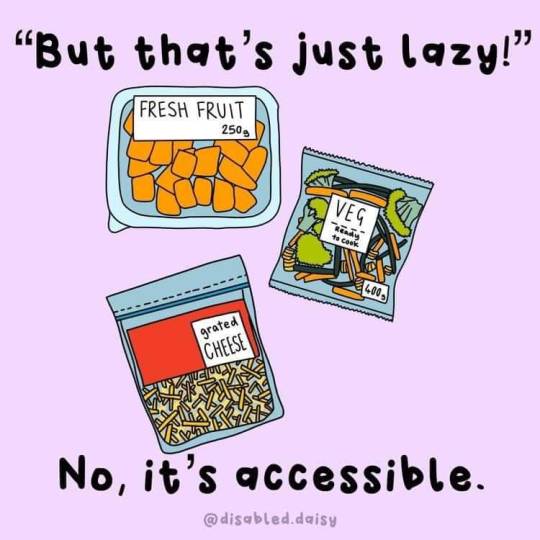
@disabled.daisy
I've noticed that abled people (NT's included) call "innovative" and "efficient" things lazy. If I can do things an easier way in a shorter amount of time while expending less energy, it's working smarter, not harder. Are they insecure because of their antiquated attitudes and lack of ingenuity? Why waste time, money and energy? They love menial unnecessary tasks that don't matter and when there's a faster/better way they think they're better than us for unnecessarily taking longer. Do they just want to feel better about their inadequacies by degrading and belittling others?

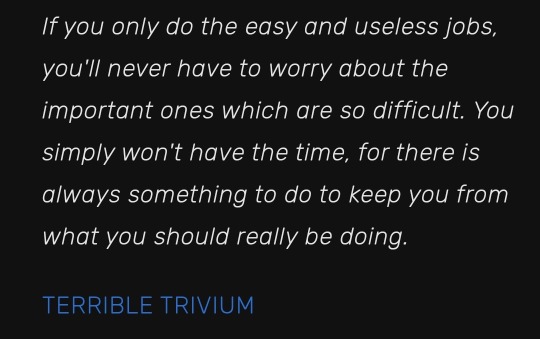
#disability#disabled representation#disabled rights#disabilties#accessibility#disabled#ableist#ableism#fuck ableists#spoon theory#laziness does not exist#adhd tax#actually adhd#adhd brain#adhd things#executive dysfunction#neurodivergent#neurodiversity#neurospicy
511 notes
·
View notes
Text

Okay but like— I don’t know if anyone has said it— Anya is 1000% neurodivergent (especially autism) coded. Yes I know she’s a demon and all but that sounds more like a cover up for her “idk how humans work” despite being one. Especially with hard emotions like this episode where she desperately wants to understand the world around her but doesn’t and no one can give her a real answer. Anyways whatever the reason I really think she is a good (for early 2000s tv that is) representation of a neurodivergent girl.
Okay rant over
#buffy the vampire slayer#buffy summers#xander harris#willow rosenberg#dawn summers#anya jenkins#spike#rupert giles#buffyverse#neurodivergent#neurodiversity#autism#representation
136 notes
·
View notes
Text
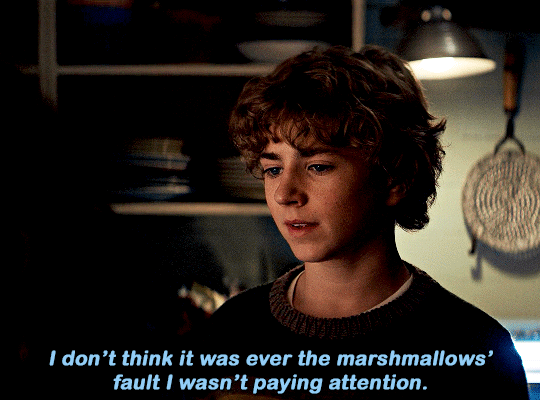
There’s an underlying bitterness in Percy’s tone in this scene, despite the fact that he’s making a “joke,” that couples with the way he doesn’t look at his mom while he says it but kind of just stares distantly. And also the way his eyebrows go up and down in a quick, wry — and almost judgmental, even — way.
This one singular line hit me so hard as a neurodivergent person because it’s all you need to see the way that Percy feels about his own inability to do “basic” things, like pay attention. He’s making a joke that’s also a dig at himself for “screwing up” in some way and it felt so relatable.
And the fact that it’s basically setting up him the next scene when he tells his mom that he thinks there’s something “broken” in his brain?
It hurt in all the best ways that seeing an accurate representation of yourself in a series that’s been your comfort series since the moment you picked it up 🥲
#send help#neurodivergent percy jackson#adhd percy jackson#percy jackson and the olympians#pjo fandom#percy jackson#pjo tv show#pjo disney+#percy series#sally jackson#pjo ep 1#accurate representation#it’s so comforting#but so painful#because of how real it feels#rick riordan#riordanverse#percy jackson show#percy jackson gif#pjo gif#and when he gets frustrated because he feels like his mom won’t listen to him#because he thinks he needs help#that felt personal#i love this series so much
2K notes
·
View notes
Text
Hey everyone! I’m featured in this @washingtonpost.com story!! For FRAMED WOMEN and #autism #disabilityrepresentation
Quoting me in the article;
“Women, even at a very early age, are taught to subjugate their needs in favor of others. They are taught to ‘behave’ and to take up less space, to not be a burden but to help support others — the men and boys or other children in their lives,” Schillace said in an interview. “What this means for autistic girls is that they learn to mask early, to hide their true natures and to ‘not be a problem.’”
In creating Jo, Schillace said she aimed to create a protagonist who “isn’t treated like a savant, and her autism — though present — does not become the most interesting thing about her. … Jo isn’t the mystery; she helps to solve one. Likewise, I (and other autistic women) are not enigmas. We are people, fellow human beings, with intrinsic value.”
https://www.washingtonpost.com/books/2024/04/01/autistic-women-mystery-fiction/
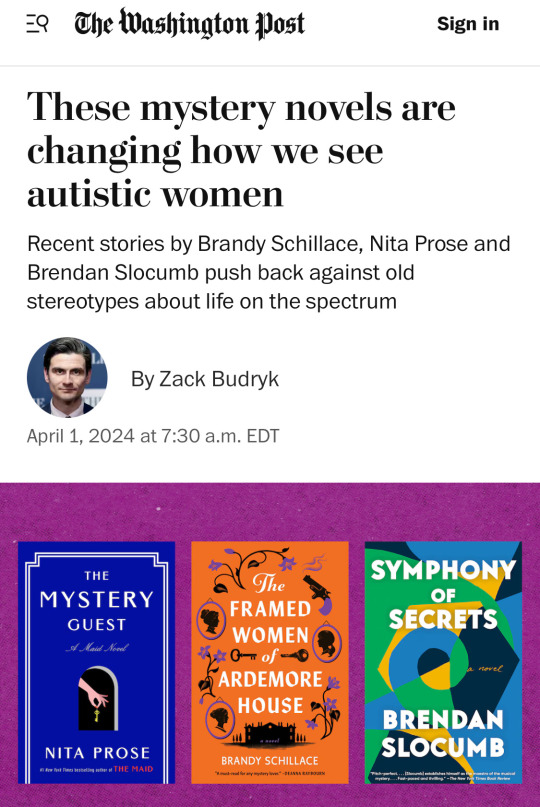
#actuallyautistic#neurodivergent#neurospicy#cozy mystery#autistic author#washington post#disability rights#disabilties#representation matters
738 notes
·
View notes
Text
Autism Representation in Films and TV Shows





Neurodivergent_lou
#autism#actually autistic#autism representation#I’m glad there’s good films out there#thank GOD they didn’t have Sia’s movie#these seem like very good movies/shows!#neurodivergence#neurodiversity#actually neurodivergent#feel free to reblog#Neurodivergent_lou (Facebook)
329 notes
·
View notes
Text
Sherlock & Co has good neurodivergent representation
I've been listening to a podcast called Sherlock & Co, and it has probably my favourite modern-day representation of Sherlock as a character. They chose to make Sherlock explicitly neurodivergent, and the proper representation fixes a lot of the issues I have with modern Sherlocks (looking at you BBC Sherlock, but also House).
He's not an asshole just for the sake of it. He doesn't lack empathy, and he genuinely cares about his friends and values human life. People aren't just a game to him. He's got trouble recognising and understanding social cues, so he comes off as rude, but he's not above apologising when it's pointed out to him. He can come off as arrogant or pompous when he gets in the zone, but it doesn't come from a place of perceived superiority. He can and will admit to being wrong. Sure, he also likes showing off, but that's the thing. He's a full, rounded human. And the show does an excellent job treating him as such. The characters close to him usually cut him some slack because of his neurodivergency, but they don't coddle him. He's expected to take accountability for his actions.
As for his relationships, this might be the only representation (modern or otherwise) of Sherlock and Watson where I fully buy into their close friendship. Because Sherlock doesn't treat Watson as a tool or someone he can show off to. He fully values Watson as a friend, and also relies on his medical expertise, people skills and pop culture knowledge. Early on he often asks Watson for his observations and deductions, and then explains his own thought process. It's clear that this isn't to shame Watson but to teach him (and the audience), to get him in on the deductions. We are shown that they value each other, not just told (which might be weird to say about an audio-based medium, but you know what I mean). And it doesn't make me constantly wonder why Watson even hangs out with this guy who clearly doesn't care about his feelings.
The show also gives Sherlock other neurodivergent traits like stimming, sensory issues, hyperfixations and rigid behavioural patterns, but they don't really become a focus at any point. It's just nice that they are acknowledged and presented as something that Sherlock needs to manage. It's also nice to have a Sherlock who knows a lot about very specific things but little about others (and also didn't do well at school because of it). He's not some supergenius with an unlimited brain capacity, he's just very dedicated to his interests and very indifferent about things that don't interest him.
Just to briefly touch on other aspects of the podcast, it's a pretty good modern-day adaptation. The cases are adapted and modernised pretty seamlessly, and they leave some room for the listeners to make their own guesses. I like the meta element of the podcast we're listening to representing the in-universe crime podcast Watson is making. And Mrs Hudson is replaced by Mariana, who starts working for their detective agency and is an absolute sweetheart.
Anyway, I wish we had more neurodivergent representation like this. All you need is a little bit of research, empathy and/or experience with neurodivergent people.
#i'm prepared to be flamed by the bbc sherlock fandom#sherlock & co#sherlock and watson#sherlock holmes#john watson#mariana ametxazurra#modern sherlock holmes#podcast#podcast recommendations#autistic sherlock#neurodivergency#autism#adhd#audhd#autism representation#neurodivergent representation
124 notes
·
View notes
Text
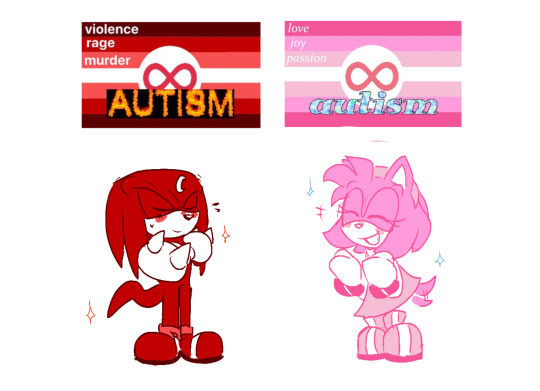
This is them. It’s canon.
#sonic the hedgehog#sonic#knuckles the echidna#sth#autism#knuckles#amy rose#amy the hedgehog#autistic knuckles the echidna#autistic Amy Rose#sonic twitter takeover#Sonic Twitter takeover 2023#autistic siblings hello#I’m genuinely so happy we’re getting representation it makes me feel so seen clenches fists#all Sonic characters are neurodivergent atp#Knux art 💎
976 notes
·
View notes
Text
SHOUT OUT TO MY GIRL LILO!!! (the og one)

Undiagnosed Neurodivergent QUEEN
#autism#neurodivergent#neurodiversity#lilo and stitch#lilo and nani#stich#ohana#ohana means family#representation#lilo is undiagnosed AuADHD and you can’t change my mind#adhd#auadhd
67 notes
·
View notes
Text
Honestly refreshed that Nona has a sexuality. That might sound weird because it's The Fucking Locked Tomb of course the sapphic girl has a sexuality. But what I'm talking about is how Nona, when you look past the fantastical causes of her existence, is disabled. She's neurodivergent. She has a lot of support needs. She fits decently well into a mainly pre-teen children friend group. But children and disabled, neurodivergent people and—yes—disabled, neurodivergent children still have sexualities. What that sexuality is can be anything. In Nona's case, it means she likes Crown's boobs and thinks hugging Cam is sexy and wants to spend her life swooning over Pash. I think that's nice.
#nona the ninth#ntn#the locked tomb#tlt#queer representation#queer rep in media#disability representation#If anyone has good tags to add regarding the disability rep I would really appreciate it#I think that I have the perspective and context to say what I said in this post but beyond that I'm not super confident#mainly it's that I am disabled and neurodivergent but not in a way that is as commonly severed from sexuality#I feel like I am the kind of AuDHD girl who more people and media allow to have a sexuality so it's like. I don't want to overstep
89 notes
·
View notes
Text
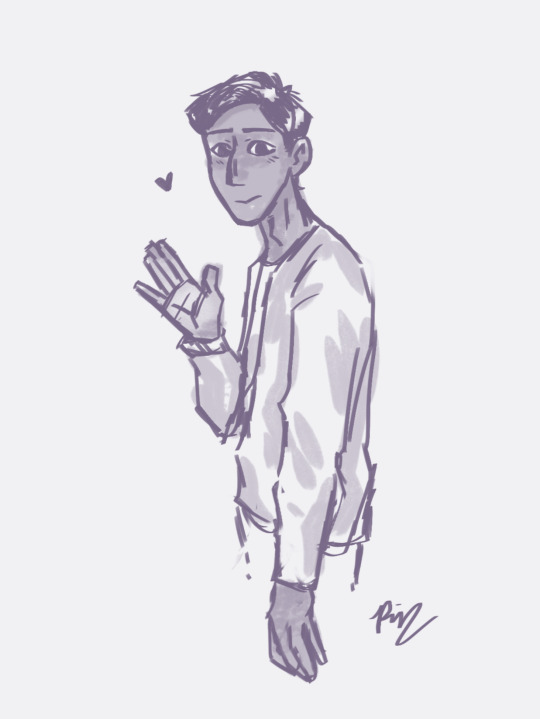
happy birthday to abed nadir! my most favorite guy ever
#thank you for the incredible autism and neurodivergence representation#my art#digital art#community#community nbc#abed nadir#birthday post
444 notes
·
View notes